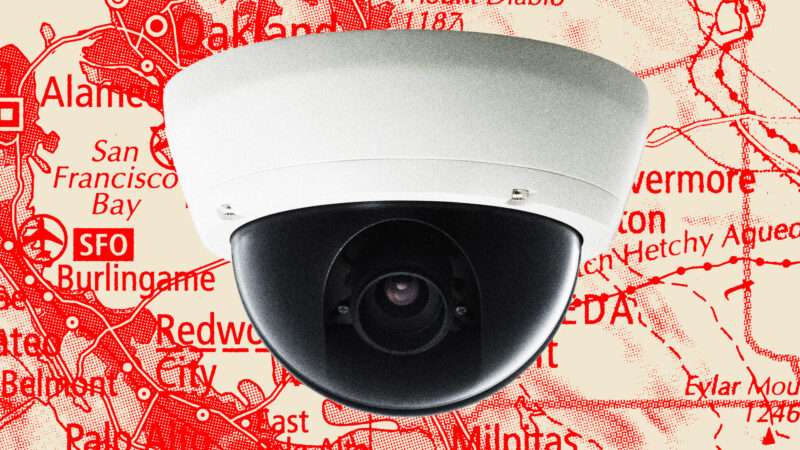
On March 5, San Franciscans will have the opportunity to vote on a ballot measure that would decide whether or not to make them into guinea pigs for surveillance experiments by the San Francisco Police Department (SFPD).
Proposition E purports to streamline the SFPD, with sections on community engagement, recordkeeping, and the department's vehicle pursuit and use of force policies. But its portion on department use of surveillance technology is troubling.
Under an existing ordinance passed in 2019, the SFPD may only use "surveillance technologies"—like surveillance cameras, automatic license plate readers, or cell site simulators—that have been approved by the San Francisco Board of Supervisors, the city and county legislative body. The process requires that the SFPD, like any other city or county agency, submit a policy to the board for approval before using any new technology. The 2019 ordinance also banned the use of facial recognition technology.
But Prop E adds a clause stipulating that the SFPD "may acquire and/or use a Surveillance Technology so long as it submits a Surveillance Technology Policy to the Board of Supervisors for approval by ordinance within one year of the use or acquisition, and may continue to use that Surveillance Technology after the end of that year unless the Board adopts an ordinance that disapproves the Policy."
In other words, the SFPD could roll out an unapproved method of surveillance, and it would have free rein to operate within the city for up to a year before ever having to ask city officials for permission. And until the city passes a statute that specifically forbids it—that is, forbidding a technology that is by that point already in use—then the SFPD can keep using it indefinitely.
"Let's say the SFPD decides they want to buy a bunch of data on people's geolocation from data brokers—they could do that," says Saira Hussain, a staff attorney at the Electronic Frontier Foundation (EFF). "They could use drones that are flying at all times above the city. They could use the robot dogs that were piloted at the border. These are all surveillance technologies that the police doesn't necessarily have right now, and they could acquire it and use it, effectively without any sort of accountability, under this proposition."
If those scenarios sound implausible, it's worth noting that they've already happened: As Hussain notes, the Department of Homeland Security recently tested robot dogs to help patrol the U.S./Mexico border. And in 2012, the Los Angeles County Sheriff's Department enlisted civilian aircraft to fly over Compton and surveil the entire area.
Not to mention, federal agencies already routinely purchase people's cell phone geolocation information and internet metadata without a warrant.
In a sense, Prop E would make San Franciscans into guinea pigs, on whom the SFPD can experiment with all manner of surveillance technology. If that sounds hyperbolic, a member of Mayor London Breed's staff told the board of supervisors in November 2023 that Prop E "authorizes the department to have a one-year pilot period to experiment, to work through new technology to see how they work."
The San Francisco Ballot Simplification Committee's description of the proposition notes that it would "authorize the SFPD to use drones and install surveillance cameras without Commission or Board approval, including those with facial recognition technology."
The ACLU of Northern California calls Prop E "a dangerous and misleading proposal that knocks down three pillars of police reform: oversight, accountability, and transparency." Matthew Guariglia, senior policy analyst at the EFF, wrote that under Prop E, police could "expose already marginalized and over-surveilled communities to a new and less accountable generation of surveillance technologies."
Despite these concerns, Prop E has its share of support. Breed defended the proposal, saying "it's about making sure that our police department, like any other police department around the country, can use 21st century technology." By January, groups supporting Prop E had raised more than $1 million—ten times the amount raised by opponents and considerably more than has been raised for any other proposal on the March ballot.
It also seems to be popular among the public: A January survey released by the San Francisco Chamber of Commerce found that 61 percent of San Franciscans favored Prop E, with only 37 percent opposed. (One possible explanation: The same survey found that 69 percent of those polled feel that crime has gotten worse. Recent data indicates that violent crime rose during 2023 even as it declined nationally, and while the rate of property crime fell, state and national rates fell faster.)
San Francisco is no stranger to potentially abusive surveillance practices. In 2022, the board of supervisors passed an ordinance that would allow the SFPD to request and receive real-time access to citizens' private security camera feeds. While city officials like Breed and newly-appointed District Attorney Brooke Jenkins touted that the ordinance would help crack down on smash-and-grab shoplifting rings, a recent city report detailed that in the third quarter of 2023, the vast majority of requests were for narcotics investigations.
The post Proposition E Would Make It Easier for Police To Surveil San Francisco appeared first on Reason.com.







